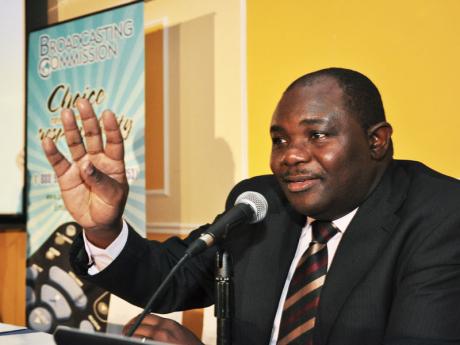Is payola down?
Sadeke Brooks, Gleaner Writer
While there is no scientific data to suggest that there has been a reduction in payola in the music industry, Cordel Green, executive director of the Broadcasting Commission of Jamaica (BCJ), says there is an indication that it is not as prevalent as it once was.
For years, the BCJ has been on a rigorous campaign to clamp down on payola in the industry. And it seems the campaign to make people more aware of the practice and its effects has been bearing some fruits.
"I have not in recent times been receiving the same volume of anecdotal evidence and complaints about payola, but there is no scientific data," Green told The Sunday Gleaner.
He added that the BCJ will continue to fight the issue "until the situation is abated".
Green says the BCJ has been engaged in a public education campaign in the hope that "people will change their behaviour in light of the new regulatory framework that is to come". He added that the commission is pushing for payola to become a criminal offence.
"What people see as 'eating a food' is having very serious negative impact on the industry. There are persons who don't see the cumulative effects of this activity, so we hope that all of these approaches will lead to an abatement of the practice, because it really has to be stamped out. It serves no good. It is absolutely negative, and it ought to be frowned on," Green said.
Despite the numerous conferences and activities done during the BCJ's digital literacy programme that also tackles payola, Green says it remains very difficult to curb the issue.
"It is very difficult to do because this is not anything new. You might never be able to completely eradicate it," he said.
Luckily, he says attention is being placed on the issue, so he hopes it will be less prevalent.
"The entire country is sensitised to payola. It is now on the lips of everybody and it is being condemned broadly," he said.
"The more the issue is spotlighted, the more people will be less bold. Everybody should have a fair chance of their music being heard, vetted and rotated based on merit."
Still prevalent to some
But Twin of Twins' Patrick Gaynor has a slightly different view, as he does not believe payola has gone down in any way.
"I think it has become the norm, people have come to see it as a reality. It is not that it ease off or change. People are seeing it as natural as breathing where the music industry is concerned," he said.
Meanwhile, singer Chevaughn says he has reached a point where he no longer pays attention to the issue.
"I've paid it less mind than I used to," he said.
"Now I've learnt greater business skills when it comes to getting your thing out there. A lot of persons turn to payola for a quick hype, but every DJ knows when a song is really good," he told The Sunday Gleaner.
He also noted that many young acts think payola is the way to go, but there are other options such as distributing CDs, doing free dubplates, free performances and using social media to share songs.
"In you promoting yourself, other DJs will hear you and start playing you. Let your music speak for you and DJs will respect you. The more heart people see you put into your thing, the more people will respect you," he said.
And, with So Mi Like It continuing to gain traction locally and abroad, Spice says she has been seeing improvements.
"I think there has been improvements 'cause I haven't been hearing about it (payola) as much as before. In a sense, I can commend the BCJ because I am seeing the ads and it keeps reminding people about payola," she told The Sunday Gleaner.



